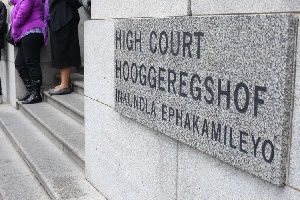Africa News of Thursday, 24 April 2025
Source: www.ghanawebbers.com
South Africa: Western Cape Schools Admission Policy Challenged in Court
Equal Education claims late applicants are blocked from accessing schools. The Western Cape Education Department argues that parents must apply on time. Equal Education wants the court to declare the admissions policy unconstitutional. They say it does not help parents who apply late due to uncontrollable circumstances. The department insists that late applicants are accommodated in their policy.
The Western Cape High Court is hearing Equal Education's application on Thursday. They argue the policy fails children with late applications. This case focuses on learners in the Metro East Education District (MEED). Six applicants include Equal Education and five parents of children with late applications for 2024. These children moved from the Eastern Cape due to unforeseen events.
In one case, a learner's mother passed away. In another, a mother moved to Johannesburg for work. Another child's mother lost her job during the COVID pandemic. These situations caused delays in applying for school placement after the year started.
Thursday's hearing is part B of this case. In July 2024, Judge Lister Nuku ruled in favor of Equal Education in part A. He ordered the department to place all late applicants in schools. Following this, the department set up new procedures and "pop-up" admission stations across Cape Town.
Equal Education continues with Part B due to ongoing issues. They want the court to declare that failing to plan for late applications violates the Constitution. They also argue that the admissions policy discriminates based on race, poverty level, birthplace, and social origin. The current policy lacks clarity on steps for late applicants and assistance available.
Equal Education argues that the department's actions violate rights to basic education. They believe education helps marginalized individuals escape poverty. Late applications often result from migration linked to socioeconomic challenges faced by disadvantaged learners.
Most affected by this policy are Black learners, according to Equal Education. Delays in school placement worsen their cycle of poverty and disadvantage. They dispute claims from the department about unprecedented late applications since they have been aware since 2014.
In court documents, the education department states that parents fail their legal duty by not applying on time for compulsory education (ages seven to fifteen). The department claims it actively raises awareness about application timelines through advocacy efforts.
Applications open between March and April each year and should be made online or at district offices for walk-in applicants. The department asserts its admissions policy accommodates late applications and encourages inquiries at local district offices.
They claim almost all learners have now been placed despite some delays being investigated further. While not admitting any defects in their current policy, they mention recent enhancements made for late applicants' admissions processes and invited input from Equal Education.











